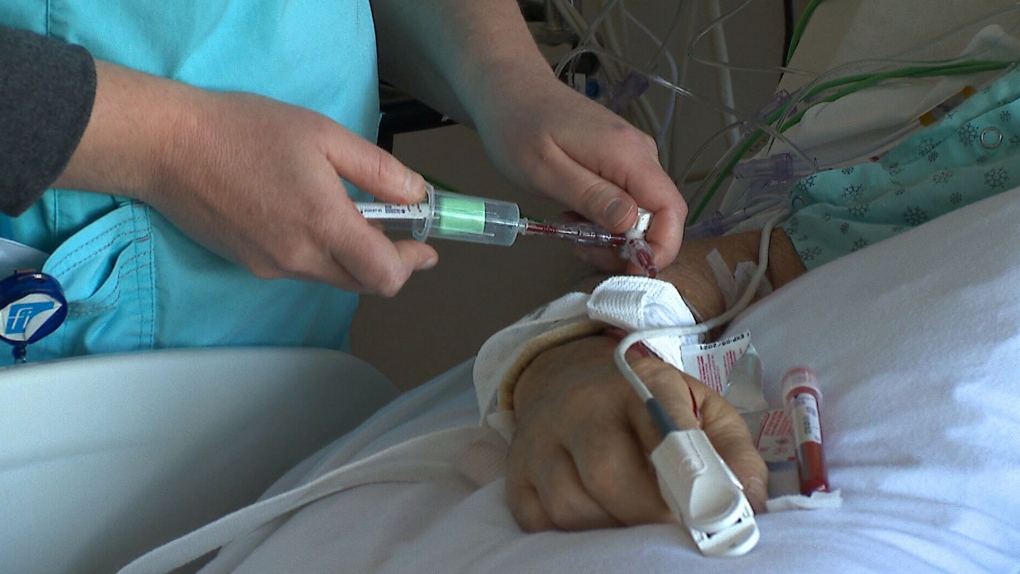Artificial intelligence used to detect sepsis quicker, 'dramatically' reducing risk of death: B.C. research

Researchers out of the University of British Columbia have found that artificial intelligence can detect sepsis quicker.
According to a UBC news release Tuesday, sepsis is responsible for at least one in five deaths worldwide, including those from severe cases of COVID-19.
But experts warn, the life-threatening condition is difficult to detect early.
UBC researchers say because sepsis is defined as the body's dysfunctional response to an infection and has a variety of symptoms – including fever, fatigue, hyperventilation and a fast heart rate – it can often appear at first to be from other diseases.
"This new technique dissects the dysfunctional immune responses involved in sepsis like never before, providing new insights into the biological processes involved in sepsis of any type, including that from COVID-19," says Arjun Baghela, a UBC graduate student who led the analysis.
"People don't know much about sepsis, but in 2020, the number of deaths from life-threatening sepsis is likely much higher than one in five, since pretty much everyone who had died from COVID-19 has actually died from sepsis."
According to the Centers for Disease Control, infections that can lead to sepsis typically start in the skin, lungs, urinary tract or gastrointestinal tract.
It can take anywhere between 24 to 48 hours before health-care providers can confirm a patient has sepsis. But for every hour delay in providing treatment, the risk of death increases by as much as 7.6 per cent, hightlighting the need for rapid detection, UBC researchers say.
"Typically, a patient arrives in the emergency room feeling profoundly ill, with a bunch of symptoms that are fairly non-specific," says Dr. Bob Hancock, UBC professor.
"The physician looks at that patient if they have an aggregate of symptoms and says, 'This is a patient that might have sepsis,' but only if they have some certainty can they start to treat them immediately. They're in a bit of a 'look-and-see' game for the first 24 to 48 hours."
Hancock adds that it's imperative to learn if the patient has sepsis as early as possible, given that it's so common and rampant antimicrobial resistance is a risk if antibiotics are used more than necessary.
For the study, published in the EBioMedicine journal, researchers examined a total of 348 patients across four continents. Scientists say they were able to confirm their findings by re-examining two other large studies, for a total of 1,062 patients.
The research found that severe sepsis can be detected when a patient first arrives for medical care.
"Using machine learning, also known as articificial intelligence, the researchers were able to identify sets of genes that predict whether a patient will acquire severe sepsis, and could make sense of the five distinct ways (subtypes/endotypes) in which sepsis manifessts itself," the study reads.
Researchers say this discovery will eventually lead to testing that will allow health-care providers to identify the body's dysfunctional response to an infection more rapidly and determine the appropriate treatment.
"This is important because two subtypes are associated with a much higher risk of severe sepsis and death," the study reads. "These biomarkers also worked in the ICU, where it was shown that one endotype was particularly deadly, with a mortality rate of 26 per cent."
Researchers add that the technique for measuring gene expression is already present in hospitals, and it can be performed within just two hours of being admitted to the emergency room.
CTVNews.ca Top Stories

BREAKING Justin Trudeau to announce he's stepping down as Liberal leader: senior source
Prime Minister Justin Trudeau has called a news conference this morning at Rideau Cottage, and there it is expected he will tell the country he's resigning as Liberal leader, according to a senior government source.
FOLLOW LIVE Live updates as Justin Trudeau expected to step down
Prime Minister Justin Trudeau is expected to step down as Liberal leader on Monday morning.
W5 INVESTIGATES One Canadian couple's fight against a contractor who defrauded them
Pull into the driveway at John and Julie Ridley's house and you'll notice large patches of red siding are missing from their house and garage. What was supposed to be a dream retirement home for the couple is now a daily reminder of what went wrong.
opinion What you need to know about filing your taxes in 2025
This year, there are several changes to be aware of when filing your 2024 taxes. Personal finance contributor Christopher Liew outlines the key changes to keep in mind as the tax deadline approaches.
Visitors to the U.K. from 48 countries must now apply and pay a fee before travel
The U.K. will introduce its ETA system on Jan. 8. ETA, which stands for Electronic Travel Authorisation, is a new digital registration scheme for travelers who don’t need a visa to enter the U.K.
Court orders WestJet to hand over flight attendant harassment files in lawsuit
The B.C. Supreme Court has ordered WestJet to hand over all its files on harassment of flight attendants, in a class-action lawsuit alleging widespread misconduct by pilots.
The Vivienne, star of 'RuPaul's Drag Race UK', dies at 32
British reality show 'RuPaul's Drag Race UK' winner James Lee Williams, aged 32, popularly known as The Vivienne, has died.
Driver who entered Canada 'without stopping' at B.C. border crossing arrested: police
A man who illegally blew through the Canada-U.S. border crossing in Surrey, B.C., Sunday morning has been arrested, according to authorities.
Trump's lawyers ask judge to halt Friday's hush money case sentencing while they appeal to block it
U.S. President-elect Donald Trump asked a judge Monday to halt this week's sentencing in his hush money case while they appeal a ruling upholding the verdict.























